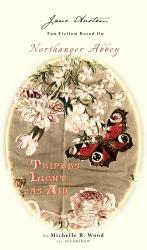inspiration + perspiration = invention :: T. Edison ::

A collection of one-shots based on Northanger Abbey: drabbles, flash fiction, missing scenes, and more. Title from Shakespeare's Othello, as quoted by Jane Austen in Chapter One. Now available as an eBook via Draft2Digital.
How often and uncomfortably Eleanor had been forced to ride in the carriage with her father, speeding from whatever whirlwind tour his whim inspired. How very different it was to invite him to join their equipage after staying as a guest, and to dictate when they should leave town and how soon they would arrive at Northanger Abbey. Even Frederick—only committed to a brief stay before he left again for Ireland—took Eleanor's words as orders, albeit with a snigger as he doffed his hat to "Her Ladyship!"
She allowed her father to loudly proclaim all they would do on arrival, and dear John betrayed no distress at the coarse crowing that would be his lot to suffer further during this visit. They had discussed the entire matter together and were of one heart: something must be done to aid Henry and Catherine, and their own comfort would be secondary to this goal.
Her opportunity came after dinner the night before their departure.
"I would ask you grant me one favour, sir," she spoke with as much diffidence as she had used to do, on his loudly wondering after what gifts might be in store for a viscountess.
"Of course, of course, I am your humble servant," was his bragging reply, spoken as if to her but aimed at her husband, who only gestured back to Eleanor with actual deference.
"We were all together last year, and it was one of the best memories I have ever enjoyed at our home." This much was true, so very true, even if there were equally fond ones the following spring. "I will be most happy to spend the entire Christmastide if Henry may be allowed to share in it."
There was a brief silence. For a moment, she expected the familiar bombast of old, but she held firm, meeting his raised brows with the conviction that came from the surety of her position, fortune or no.
"Why, of course your ladyship," he answered with continued assumed servility, then launched into further swaggering pronouncements about the family. It was not a great concession.
But he had said the words, had agreed, had relented that much! They were hopeful, very hopeful, that a greater miracle might be in store ere the year closed.
Title from Chapter 31 of Northanger Abbey: "I know no one more entitled, by unpretending merit, or better prepared by habitual suffering, to receive and enjoy felicity."





